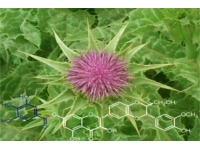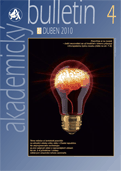
Czech scientists have developed new anti-cancer substances
New possibilities in the treatment of cancer diseases have been opened by a discovery by Czech and Spanish researchers. The team of prof. Vladimír Křen from the Institute of Microbiology (MBÚ) of the ASCR along with the team of prof. Jitka Ulrichová from the Faculty of Medicine of Palacký University in Olomouc and with scientists from Universidad de Málaga in Spain have developed new derivatives with antiangiogenic activity on the basis of silybin ‒ substances obtained from milk thistle (Silybum marianum).
So-called antiangiogenic substances hinder the development of the vein feeding of tumours. These
then do not spread further or are destroyed as a result of the lack of nutrients and oxygen. The
theoretical bases of this relatively new therapy of cancer diseases, which is very selective and
does not harm patients like e.g. classical chemotherapy, were laid already in the 1980s. It is
often used as a complementary treatment along with other therapies.
‘The substances which we have now developed are based on the combination of the structures of
the anti-cancer substances from green tea (so-called epigallocatechin gallate, EGCG), where the
methods of so-called supramolecular chemistry and methods of chemical and enzymatic synthesis were
employed. The biological tests clearly showed the significant antiangiogenic effects of some of the
new substances. The advantage of the biological tests, which were conducted at the workplace in
Olomouc, is that they utilise so-called tissue cultures (derived from human cells acquired from
umbilical cord blood, HUVEC), hence it is not necessary to use, at least at this stage, laboratory
animals. The substances developed of which the best is 7-O-galloylsilybin B, have very low (or no)
toxicity. The results of this research, which has a striking potential for usage in selective
therapies of cancer diseases, were published at the end of 2011 in the prestigious American
journal, the Journal of Medicinal Chemistry,’ is how prof. Křen presents the research achievement
of his team.
Citation:
R. Gažák, K. Valentová, K. Fuksová, P. Marhol, M. Kuzma, M. A. Medina, I. Oborná, J.
Ulrichová, V. Křen: Synthesis and Antiangiogenic Activity of New Silybin Galloyl Esters.
Journal of Medicinal Chemistry 54, 7397‒7407 (2011).
More information:
prof. Ing. Vladimír Křen, DrSc., Centre of Biocatalysis and Biotransformation, Institute of
Microbiology of the ASCR, v. v. i.; tel.: 296 442 510; e-mail:
kren@biomed.cas.cz;
www.biotrans.cas.cz
Prepared by: the Institute of Microbiology of the ASCR and Department of Media Communication of
the Head Office of the ASCR
17 Jan 2012



